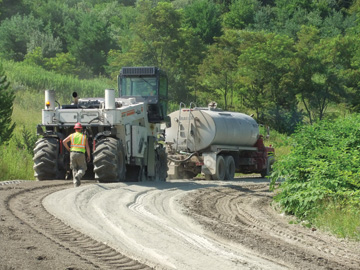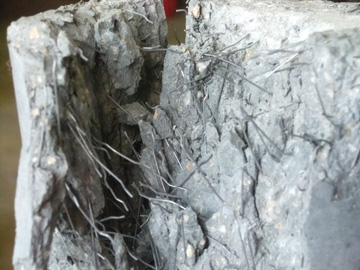Roller compacted concrete (RCC) being installed at the Rosebud No. 78 prep plant in Windber, Pa.
• Stone covered surface haulage roads. The majority of Rosebud’s roads fall into this category. While receiving heavy usage, they continually rut and require yearly maintenance;
• Concrete roads and storage slabs. This type of surface is found within the eight prep plants and at the end of haulage roads prior to intersecting public highways.
• Underground travel ways exposed to mining scoops using chains. The high abrasion loading resulting from this type of equipment quickly degrades conventional concrete.
The company recently embarked on a program to evaluate several products to improve the performance and safety of these surfaces while attempting to reduce maintenance expenditures.
Roller Compacted Concrete
Roller compacted concrete (RCC) is very dry, stiff concrete that is placed with conventional asphalt paving equipment, and then compacted with rollers. As with conventional concrete, it uses cement, stone, and sand. It doesn’t require formwork and is often not jointed. The product can take foot traffic and light vehicle loading immediately after rolling, and heavy vehicle loading the day after placement. Compared with conventionally formed concrete, the in-place cost of roller compacted concrete is appreciably less because of placement efficiencies, high placement rates and the absence of labor intensive formwork. In most markets, RCC has an in-place cost equal to or less than asphalt.
 A full depth reclamation (FDR) project at the Rosebud Brush Valley mine access road in Homer City, Pa.
A full depth reclamation (FDR) project at the Rosebud Brush Valley mine access road in Homer City, Pa.
RCC was developed in Canada in the 1970s for use in its logging industry. With some logging yards as large as 40 acres, RCC met the requirement for high performance at a low cost. One of the largest projects in Pennsylvania is the Baker Hughes facility in Lock Haven. It required nearly 15,000 cubic yards of RCC and was completed in early 2013. Nationwide, the largest RCC to date is the Honda automobile plant in Lincoln, Ala. Completed in 2001, it required more than 140 acres of RCC for its roads, parking and staging areas.
Rosebud recently completed its first RCC project at the No. 78 prep plant in Windber, Pa., during an outage in the summer of 2013. The product is currently under evaluation.
Full Depth Reclamation
Existing asphalt, stone roads or parking areas are pulverized and mixed with cement or cement slurry during full depth reclamation (FDR). The resultant blend is leveled and compacted with a roller. This area is then covered with pavement or stone sub base. FDR technology came to Pennsylvania with the boom in Marcellus gas exploration. Heavy drilling equipment damaged large sections of rural roads in north central PA and needed to be rehabilitated economically. Texas based drilling contractors were familiar with FDR due to its extensive use by Texas DOT.
The first FDR application by Rosebud was for the Bigler cleaning plant haul road in early 2013. Performance of the product at the time of this article has been excellent and it has been specified for the haul road at the new mine at Brush Valley. Rosebud is looking at this technology as a widespread solution to its network of stone covered haul roads.
Steel-fiber Reinforced, High-strength Concrete
At the Rosebud mine in Heilwood, mining scoops using chains have continued to damage a 15° underground slope travel way. Rosebud recently overlaid the slope with 8 inches of 6,000 psi steel fiber concrete. While most of their concrete experience has been with 4,000 psi, a local concrete producer experienced in high strength concrete agreed to provide the mix that also included 65 lb/cu yd of steel fiber. The addition of steel fiber to concrete started in the early 1980s and improves ductility of the concrete as well as replacing the reinforcing bars. The concrete was sprayed with a liquid curing compound and will remain out of service for three days during a scheduled outage. The mix will be evaluated over a 6-month period.
Cementitious Metallic Topping
Rosebud has also started evaluating a metallic topping for use in areas where other products do not perform. Variations of the topping have been used as steel mill and waste transfer station flooring since the 1970s. It can be sprayed (dry method shotcrete) or poured and may prove beneficial in areas exposed to high abrasion or impact loading.
 A close-up of steel-fiber reinforced concrete that Rosebud Mining used for an underground slope travelway at the company’s Heilwood mine in Heilwood, Pa.
A close-up of steel-fiber reinforced concrete that Rosebud Mining used for an underground slope travelway at the company’s Heilwood mine in Heilwood, Pa.
Future evaluations will look at combining some of the approaches described earlier in this article. One is the use of steel fibers in RCC as a way to replace the reinforcing steel. Another area of interest is overlaying the RCC with metallic topping for surfaces exposed to tracked vehicles.
Deteriorating haulage roads and travel ways can adversely affect worker safety and productivity, and require continual maintenance time and money. Working with local contractors and suppliers, Rosebud is evaluating products and methods from other industries to meet the varied needs of their infrastructure. Transferring proven technologies to remedy these problems can improve the bottom line at many mining companies.
Ed Stock is Manager for Construction Services for Rosebud Mining Co., based in Kittanning, Pa. Eric Wetzel is a sales engineer for BASF Construction Chemicals based in Beachwood, Ohio (eric.wetzel@basf.com).




